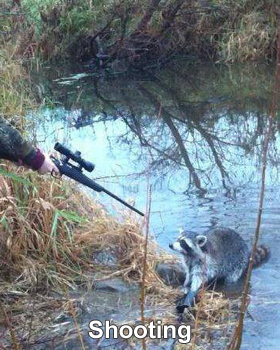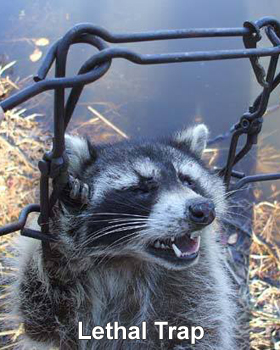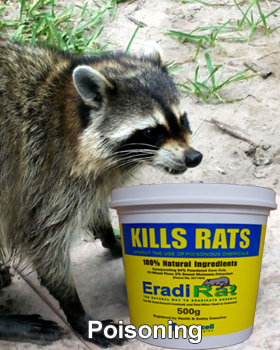What's the Right Thing To Do? We don't expect to change people's inherent views on wildlife. Some people view other mammals as sentient creatures that feel emotion, and some people view animals
as a resource to harvest or as something God gave us
inalienable dominion over. Humans have far more power than any other animal. People have built amazing
technology (guns, for example) that even a child or amateur can operate. It's EASY to dominate wildlife and do as we choose. It's very easy to kill raccoons - we have the choice to protect
or destroy them.
What's the Most EFFECTIVE thing to do? Here's where anyone, regardless of their views on hunting or killing animals, can use logic and common sense. The fact of the matter is
that killing raccoons is rarely the most effective means of solving a raccoon problem. Killing may seem like a simple and logical choice: [raccoon problem] minus [dead raccoon] equals [problem solved!].
But it's not as simple as that. Killing a raccoon or two won't mean anything if your habitat encourages more and more to come. Are they eating out of your garbage cans? Eating pet food? Pooping in your
swimming pool? That will keep happening forever! You want to modify your garbage cans, pet food, and pool, and then the problem will stop forever. Read our raccoon prevention
page for truly logical and effective methods of solving a raccoon problem.
Killing Raccoons Can Backfire: What if you have raccoons in your attic, and you decide killing is the best way to go? Little did you know, a raccoon in the attic, 85-90% of the time, is a
female with a den of baby raccoons up there. If you kill the adult female, now there's a litter of raccoons in your attic that will start screeching, potentially crawling around or scratching at your walls,
and will eventually starve to death, die, and rot inside your house, causing a big odor problem (and later, fly problem). It would have been so much easier to just follow our easy tips on our how to get raccoons out of an attic
page. Usually you can just scare the female into moving out on her own, and she'll bring her young with her! A way better, smarter solution!
I'll now analyze a few of the common methods people use to kill raccoons.
Shooting: If you own a firearm and can legally fire it where you live, you have the option to shoot a raccoon. Many fur trappers or hunters who do shoot raccoons have trapped them in inhumane
paw/foot hold traps first. It's very unlikely that a homeowner, in a residential setting, will shoot a raccoon. However, among methods to kill a raccoon, if you insist on doing it, and can get a clean letal shot,
this is one of the more humane methods of killing an animal.
Lethal Trap: Some fur trappers or nuisance wildlife control companies use lethal traps on wildlife. The most common type is the body grip trap, also called the connibear. It's basically a giant
mouse trap - metal bars with springs on the end, and a trigger. You set it over an area the raccoon will stick its head through, such as over a hole. The animal sets of the trap, and with luck, will have its neck
broken and will be strangled to a relatively quick death. But oftentimes it does not fire exactly across the throat where you want it, and it can result in a terrible, long, painful death. The biggest drawback with
setting this type of trap is that it can very often kill the wrong animal - it happens all the time. Pet cats, dogs, or other wildlife (I even saw one case of a Great Horned Owl that got killed by one of these things)
- they all could wander into this trap. I consider these traps dangerous and of course, inhumane. Fur trappers will keep using them, but they are a poor choice for urban wildlife control.
Poison: The worst of all. The use of poison for wildlife control is the very definition of ignorant, lazy, and inhumane - the very thing this website stands against. Poison is also just plain ineffective,
which is the other thing this site stands against. We want you to resolve your wildlife conflict! But poison is a horrible choice for many reasons. First of all, it's illegal to use for raccoon control. Second, it's no guarantee that
you'll get the raccoon to eat the poison. It's just as likely that a neighborhood cat (perhaps a pet), or dog, or opossum or skunk will eat it. Third of all, depending on the type of poison, there's a strong chance that the animal will
get very sick and suffer, but not die, and will recover. Fourth, if the poison does work, and you're dealing with a raccoon in your attic, walls, porch, shed, etc, that animal will crawl into a tight dark space to die. When that happens,
you may not be able to reach the carcass, and when it rots over the next two months, creating a horrible odor, you will regret it. People attempt to use warfarin, difenacoum, brodifacoum, bromadiolone, ethylene glycol, cholecalciferol, or even
strychnine, and the results are always terrible. Thank you for reading this.
How To Kill A Raccoon In a Cage Trap: What if you've already caught a raccoon in a cage trap, and want to kill it? The two best ways are to use a CO2 chamber, which is considered a comparatively humane
method, because the animal gets dizzy and passes out due to lack of oxygen, and dies in this passed out state. The other good option in this case is lethal injection. You can very likely bring your trapped raccoon to your
local county animal services for either of these euthanization methods. Click here for locations in your town. If you can safely and effectively handle a firearm, a shot to the head can also do it.
There are other very lazy and extremely cruel methods to kill an animal in a cage, used by ignorant hillbillies, but I don't even want to list them here. Please do the responsible thing. You can also consider putting the
cage in your car or truck and driving it 10 miles away from the capture site and relocating it. This is not necessarily good for the animal (or the existing animals in the area of relocation), but it is sometimes a better
option than killing the animal. Read more about trapping raccoons in cage traps here.
Should Raccoons Be Protected? We are aware that raccoons are not in short supply. They are urban animals, and very common in most cities and neighborhoods. They are very crafty, and they do tend to
cause trouble in many cases. Biologists and animal behavior researchers understand that raccoons exhibit a wide variety of complex emotions, just like a pet dog. They also feel physical pain every bit as real as
humans do. You have a choice, and we hope you will choose to be humane. Thank you. For effective ways to solve a raccoon problem yourself, or to find local help, click the below buttons:



